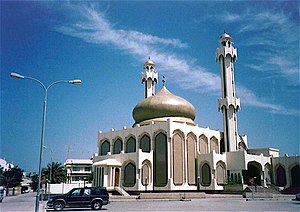Islam in Bahrain
| Islam by country |
|---|
 |
|
|
Islam is the state religion in Bahrain. Due to an influx of immigrants and guest workers from non-Muslim countries, such as India, the Philippines and Sri Lanka, the overall percentage of Muslims in the country has declined since the late 20th century. Bahrain's 2010 census indicated that 70.2% of the population is Muslim.[1] The last official census (1941) to include sectarian identification reported 16% as Shia and 84 per cent as Sunni of the Muslim population.[2]
History

Prior to Islam, the inhabitants of
The origins of
The
The defeat of the Qarmatian state saw the gradual wane of their revolutionary brand of Ismaili Islam. Instead, under a process encouraged by Sunni rulers over the next four hundred years, Twelver Shia Islam became entrenched. According to historian
Present Day (2021)
Official and unofficial sources estimate sectarian identification to be approximately 51%


The country observes the Muslim feasts of Eid al-Adha, Eid al-Fitr, Muhammad's birthday (Mawlid), and the Islamic New Year as national holidays.
"Political liberalisation" under
The government has made concerted efforts to erode the Shiite citizen majority and tip the country's demographic balance in favor of the Sunni minority, mostly by recruiting foreign-born Sunnis to serve in the security forces and become citizens. Meanwhile, hundreds of Bahrainis have had their citizenship revoked in recent years, including a number of Shiite leaders and activists. Since 2011, the government has maintained a heavy security presence in primarily Shiite villages. Security personnel restrict the movements of Shiite citizens and periodically destroy their property.[10]
See also
- Religion in Bahrain
- Beit Al Qur'an
- Muharram in Bahrain
- Rashid Al Marikhi
References
- ^ "General Tables". Bahraini Census 2010. Archived from the original on 2012-03-20. Retrieved 2013-03-31.
- ^ Qubain, Fahim Issa (1955) “Social Classes and Tensions in Bahrain.” The Middle East Journal 9, no. 3: 269–280, p. 270
- ISBN 9781136136269. Retrieved 30 October 2019.
- ^ Juan Cole, Sacred Space and Holy War, IB Tauris, 2007 pp32
- ^ Ali Al Oraibi, Rationalism in the school of Bahrain: a historical perspective, in Shīʻite Heritage: Essays on Classical and Modern Traditions by Lynda Clarke, Global Academic Publishing 2001, p. 331
- ^ Al Jazeera: وثيقة بحرينية: الشيعة أقل من النصف, 1973, retrieved 14 February 2021
- ISBN 978-1-137-03178-5.
- ^ abbas (2006-09-04). "Political Naturalization in Bahrain: Various Violations of Citizens and Foreign Workers Rights". BCHR. Retrieved 2024-03-19.
- ^ Independents the biggest winners – Gulf Daily News, 1 Nov 2010
- ^ "Bahrain | Freedom House". Archived from the original on 2018-07-19. Retrieved 2018-11-23.
External links
- Bahrain Career Opportunities Archived 2020-01-12 at the Wayback Machine
- US State Department
- Conspiring Against the Shia of Bahrain Archived 2017-10-17 at the Wayback Machine, Bahrain Center for Human Rights, October 2006
- Discrimination in Bahrain: The Unwritten Law Archived 2017-10-19 at the Wayback Machine, Bahrain Center for Human Rights, September 2003
- Video: Political Naturalization in Bahrain (2002) Archived 2017-10-19 at the Wayback Machine
- At least Bahrain is trying to address Sunni-Shiite divisions, Daily Star editorial, 12 May 2006 (from Bahraini.tvwebsite)
